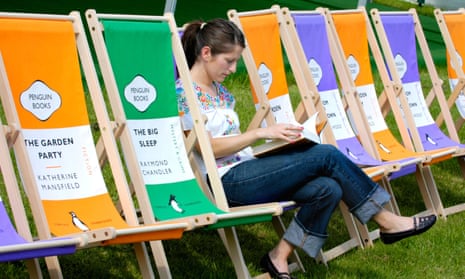Lauren Groff did something brilliantly subversive last week. In her New York Times By the Book Q&A – an interview in which authors are asked such questions as “What’s the last great book you read?” and “What book by somebody else do you wish you had written?” – she named only women authors. You may not notice it at first, but about halfway through it clicks – perhaps because naming only women in a discussion about great books is so unusual, a point that she hammers home when asked about her ideal literary dinner party:
“I would invite every woman writer I have mentioned here, plus hundreds of others I did not have space to name. I would serve unlimited quantities of excellent wine and we would get blitzed and the conversation may eventually meander to touch on that most baffling of questions: When male writers list books they love or have been influenced by — as in this very column, week after week — why does it almost always seem as though they have only read one or two women in their lives?”
This week, a bookseller working at Waterstones in Uxbridge said on social media that, while they had never had a female customer say “I don’t read books written by men”, male customers tell them they don’t read women at least once or twice a month. This, predictably, led to a cacophony of “not all men”s, and the original point was somewhat lost. It’s certainly true that there are male readers out there who read women: my father, for one, loves Ursula K Le Guin and James Tiptree Jr (aka Alice Bradley Sheldon), has read The Golden Notebook and greatly admires the work of Gitta Sereny. (He also introduced me to the poetry of Hera Lindsay Bird.) Several of my male friends read women, too. I remember a few years back being pathetically impressed when my friend, a neuroscientist, said his favourite author was Virginia Woolf.
So, I’m aware such readers exist. But the fact remains that many men continue to be put off by a female name on a book cover, especially if that cover looks cutesy or at all feminine – just look at the books of Elena Ferrante, one of the greatest novelists writing today. As Groff said, male novelists and critics too rarely cite women writers as influences. What we consider “great literature” continues to be shaped by men, because too many men only consider other men to be worthy competitors (and indeed, maybe such novelists aren’t so much interested in learning about humanity as they are in learning about other male novelists, so that they can then strive to better them).
Much has been made of the notion that the era of the “Great White Male Novelist” is coming to a close. Readers are crying out for new voices, but I remain unconvinced they’ll get the attention they deserve. The privileged do not relinquish their power so easily; they’ll continue to read and recommend one another, glad-handing those that fit the mould, offering those vital leg-ups that are elusive not just to female authors, but authors from other backgrounds, too. I overheard at a party recently that if you don’t have a quote from a male novelist on your novel then it won’t do well. While I doubt such a generalisation is completely true, it did strike fear into this first-time novelist. (All my endorsements are from – brilliant – women.)
What baffles me – and I have written about this before – is that you can read only male authors and somehow consider yourself well read. Lots of feminists didn’t like Philip Roth, but my God, they read him. Female readers do not have the same myopia, perhaps because male authors claim a universality of which women writers tend to steer well clear. As Anne Enright once wrote: “If a man writes ‘The cat sat on the mat’ we admire the economy of his prose; if a woman does we find it banal.”
Let’s be honest: you are not “well read” if you don’t read women. You cannot consider yourself a man of letters if you leave the women of letters on the bookshop shelf. Just as we would regard anyone who said “I don’t read the Russians” or “I don’t read working-class authors” as shallow, saying “I don’t read women” just makes you look as though you lack curiosity. We all have our preferences, or things that we just don’t get, but to proudly proclaim your ignorance? That’s something else.

